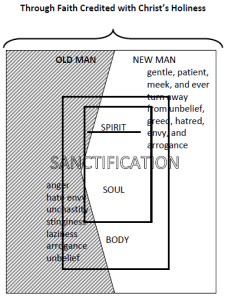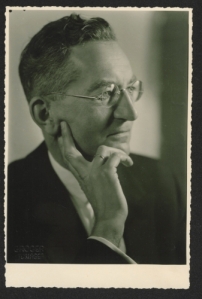
On my heart imprint your image,
Blessed Jesus, king of grace,
That life’s riches, cares, and pleasures
Never may your work erase;
Let the clear inscription be:
Jesus, crucified for me,
Is my life, my hope’s foundation,
And my glory and salvation!
– Johann B. Konig
Sometimes there are Christians who wonder whether or not they are really Christians. They are beset by doubt because when they look at their actions, they cry out, a la the Apostle Paul in Romans, chapter 7:
“I do not understand what I do. For what I want to do I do not do, but what I hate I do….”
Here is where Lutherans in particular have always been keen to highlight what Paul says at end of chapter 7 and beginning of chapter 8:
“Who will deliver me from this body of death? Thanks be to God through Jesus Christ our Lord! So then, I myself serve the law of God with my mind, but with my flesh I serve the law of sin. There is therefore now no condemnation for those who are in Christ Jesus….”

This, we assert, is Paul talking about his struggle as a believer in Christ, not him in a pre-conversion state. It is Paul – prior to showing us (in chaper 8) that “there is potential for doing the law in the new creature”, albeit never perfectly until the life to come (contra more liberal Lutheran theologians like Steve Paulson – see here) – showing us the very real struggle all Christians experience and will continue to experience this side of the grave.
This is the comforting answer we can give to persons troubled by wicked things they see themselves doing – and are rightfully troubled by.
But are Christians also to be as troubled by their wicked desires and thoughts?[i] They are, as the rest of Romans 7 likewise indicates. Otherwise, Christ would have not spoken as harshly as he did in Matthew 5, for example, about our internal states. Such preaching – “anyone who is angry with a brother or sister… will be in danger of the fire of hell ; …anyone who looks at a woman lustfully has already committed adultery with her in his heart…. If your right eye causes you to stumble, gouge it out… ; love your enemies and pray for those who persecute you… – should rightly terrify us and send us not from but to God, who we also learn, is gracious towards His own enemies.
And knowing the love of God in Christ, the process of doing good for the right reasons and motivations can begin. As the Apostle John says regarding the power of God’s love: “There is no fear in love, but perfect love casts out fear. For fear has to do with punishment, and whoever fears has not been perfected in love….” (I John 4)

Again, the Apostle Paul, this time in Galatians chapter 5, helps us to understand what is going on here[ii]:
“You, my brothers and sisters, were called to be free. But do not use your freedom to indulge the flesh ; rather, serve one another humbly in love. For the entire law is fulfilled in keeping this one command: “Love your neighbor as yourself.” If you bite and devour each other, watch out or you will be destroyed by each other.
So I say, walk by the Spirit, and you will not gratify the desires of the flesh. For the flesh desires what is contrary to the Spirit, and the Spirit what is contrary to the flesh. They are in conflict with each other, so that you are not to do whatever you want.[iii] But if you are led by the Spirit, you are not under the law.
The acts of the flesh are obvious: sexual immorality, impurity and debauchery; idolatry and witchcraft; hatred, discord, jealousy, fits of rage, selfish ambition, dissensions, factions and envy; drunkenness, orgies, and the like. I warn you, as I did before, that those who live like this will not inherit the kingdom of God.
But the fruit of the Spirit is love, joy, peace, forbearance, kindness, goodness, faithfulness, gentleness and self-control. Against such things there is no law. Those who belong to Christ Jesus have crucified the flesh with its passions and desires. Since we live by the Spirit, let us keep in step with the Spirit. Let us not become conceited, provoking and envying each other.” (bold mine)

As we can see, there really is a sense in which we are not fully perfect in love (our active sanctification) – in spite of having known and received that perfect, saving love in Jesus Christ! (our justification and passive sanctification). We deal with the matter of our flesh… our old Adam…. our “sinful nature” – even though God’s Spirit does good in us in spite of our being aware of it, we also keep “in step with the Spirit”, continuing to consciously and actively struggle vs. our evil desires (see Rom. 8: 5, 13). Knowing who we are in Christ – and with time in God’s word, prayer, and other disciplines (perhaps private confession and absolution with a pastor), etc. – these sins of weakness can be countered.
Or is this really the way that it is? After all, our salvation is truly won in Christ after all! After all, it is true that “everything we need we already have”…. Are not things like wicked desires and thoughts unavoidable and something we should not really worry about too much? Isn’t the point of Jesus’ words quoted above simply to show us that we need him and nothing more?
Some might wonder what I am talking about here, so let me explain why some might think this way. Perhaps, one thinks, all of that talk about fighting evil desire and thought is being overly scrupulous and too focused on one’s self! After all, how does this kind of think help me decrease and Christ increase? How is that focused on one’s neighbor – which Christ wants us to do – at all? Perhaps the most that we can say is that God’s law is there much in the way that good roads and traffic laws are there: to make sure that we don’t hurt our bodies! Or perhaps we should just say that the Christian disciplines his “outward person”, or flesh, so that the sinful desires that still dwell within just don’t express themselves as outward works… Either way, one might reason, our evil thoughts hurt no one except ourselves! Sure they also need God’s forgiveness, but we should not fret too much over them. There is a danger, one might think, that we are proudly trying to gain too much control, earn our salvation before God, even be our own god….

I hope it makes sense now why some Christians might think this way. In which case, what might follow from such thinking?
Truly, one might rationalize (justify), if a person finds one’s self fearful to even “commit” one wicked thought – because they are concerned about God’s wrath – are they even acting like a Christian? Worse – do they perhaps just not “get” I John 4 at all? Even if such a person regrets being motivated by fear – and even if they insist that they know they are not saved by their works but by grace though faith – could you (should you?) even give such a person assurance they are a Christian? Perhaps they have never even begun to understand the grace of God….! Perhaps they still need more law.
But is this just what Satan wants us to think? Is this not, perhaps, again putting such a person under Luther’s “monster of uncertainty?” (“maybe I am just a ‘legalist’ who has never ‘got it’ and still can’t….”) Is this perhaps one of the devil’s most clever and insidious efforts to get the camel’s nose in the tent? Is it possible that in striving for holiness of thought, as well as word and deed, we are not scorning the white robe of Christ’s righteousness (and, inevitably, because we are always primarily sinners, actually putting on the dirty robe of our self-justifying flesh)?
Consider the following:
First, sin is lawlessness – whether it happens in the mind, with the mouth, or with the hand. In every case, sin directly dishonors our Creator and hurts us (and our neighbors indirectly). So while Jesus’ words surely do break us in their severity, are we really comfortable thinking that there is no sense that he wants us to take serious practical steps to decrease such desires and thoughts – that we may be able to pray, as the 17th c. Christian John Gerhard did, “Sins were sweeter to me than honey and honeycomb. That they are now pungent and bitter, I owe to You who gave me spiritual taste…”?

Second, we know that our internal states can and do affect the world around us – at the very least because of the prayers the Spirit prays in us as He groans (see Rom. 8). How can we be sure that our evil desires and thoughts do not have power that we do not understand? If we can know – somehow! – that we are being watched, who is to say that our internal states can have no discernible effect on our surrounding environment – beyond, but even in, the present moment? Is it not rationalism to assert otherwise?
Third, even if this previous point seems a stretch for us, at the very least the Apostle Paul makes it clear in I Corinthians chapter 7 that some of our choices are more beneficial than others… If this is the case with two “good choices” (one better than the other), how much more so for the choice to fight sinful desire and thought! Yes, God can forgive all of our sins, but we also, by our Spirit-led choices, will form our long-term character: we either take steps that make us increasingly better or worse at becoming true servants of our neighbor.
Finally (and these are just the points I have come up with here – add more in the comments), as a pastor friend of mine puts it “disciplining the self can be self-absorbed if done with the wrong intentions (e.g., meriting one’s salvation), but it can also be focused on God and neighbor (to serve them better).” Luther often makes this point in his writings, particularly the Freedom of the Christian. Therefore, what might look like “spiritual self-preservation” (like the eye-gouging mentioned by Jesus) is never really an end in itself.
In Romans chapter 12, Paul gently appeals to Christians, “by the mercies of God” (please read chapters 1-11 if you are not really sure what that means!), to “be transformed by the renewal of your mind, that by testing you may discern what is the will of God, what is good and acceptable and perfect.”[iv] He then goes on, of course, to give Christians guidance regarding what their wonderful new life in Christ is to look like (a life which is not about living in glory, but humbly, under the cross).
And if you feel condemned by that thought, I understand…. for I think the devil and his lies have made things very hard for many of us. We have been both victims and victimizers. I offer you this, from the bottom of my heart:
However many of God’s commandments we may have broken, however much we may have chosen paths that were not those He would have preferred, however many regrets we might have… those are to be left behind, as we go forward in both His pardon and power, which always avails for us in the blood! And let’s especially continue to lift up the true body and blood of Jesus for us here – in the Lord’s Supper – since that is what many, strangely, since the beginning of the Reformation have been keen to deny. But I submit a greater realization of such gifts is in fact our highest need!
Also, for more encouragement in your fight, I offer you this (and this again as well…):
+Nathan
FIN
Notes:
[i] In bringing up this topic, I hope it goes without saying that this author, like most anyone else I assume, would not want anyone knowing what he is thinking quite a bit of the time. I suspect the thought horrifies most all of us, some of us much more than others.
[ii] Luther, in his Freedom of a Christian said: “The reason why seemingly contradictory statements are often made in the Bible about Christians is due to the Christians two-fold nature. The simple fact is that within each Christian two natures constantly oppose each other. “The flesh wars against the spirit and the spirit wars against the flesh” (Gal. 5:17).
[iii] The translation of this verse is disputed See verse 17 in the KJV text.
[iv] Luther said in his antinomian disputations that the preacher should not make the law overly harsh among the justified but should change into the gentler tone of exhortation. This, it seems to me, is clearly happening in Romans 12 ff. Is not Paul addressing the Christian qua Christian (new man) here? One certainly cannot say that here he is talking to the old man here, using law (and its accusation, threats, etc) to subdue him. He is appealing to persons by the mercies of God.
Image credits: Steven Paulson: https://www.luthersem.edu/faculty/fac_home.aspx?contact_id=spaulson ; Adolf Köberle – http://www.leo-bw.de/web/guest/detail/-/Detail/details/PERSON/wlbblb_personen/118564161/K%C3%B6berle+Adolf ; other people: Wikipedia















